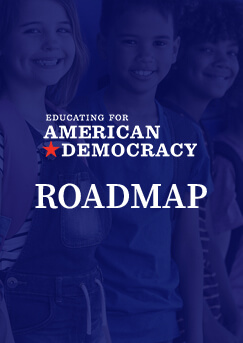Get the Roadmap and Report to unlock the work of over 300 leading scholars, educators, practitioners, and others who spent thousands of hours preparing this robust framework and guiding principles. The time is now to prioritize history and civics.
EDUCATING FOR AMERICAN DEMOCRACY:
Educating for American Democracy, a project of iCivics, is committed to respecting the privacy rights of all visitors to and users of our website at EducatingforAmericanDemocracy.org. The following privacy policy (the “Privacy Policy”) applies when you visit the Website, when you fill out a contact form, or otherwise share your personal information with the Educating for American Democracy Project (collectively, our “Services”). Please read this Privacy Policy carefully as we wish to help you better understand the information we gather, how we use it, how we disclose it, and your options regarding our use of, and your ability to correct, this information. This Privacy Policy may be modified from time to time, so it is advisable to review it frequently. All changes will be posted here. By accessing, using or visiting the Website, you agree to be bound by all the terms and conditions of this Privacy Policy as posted at the time of your access, use or visit. If you do not agree with this Privacy Policy, please stop using this Website.
what personal information we collect, how we collect it and how we use it
Our Services allow visitors and members to learn about and interact with the Educating for American Democracy Project. The Educating for American Democracy Project collects personal information about you such as your name, email address, and state of residence only if you voluntarily submit it to us by filling out a contact form or a form to download the Roadmap and Report. We automatically collect other information relating to your visit to our Website, such as your IP address, the server into which your computer is logged on, your browser type, operating system, browser language, and service provider (collectively, “automatically collected information”). We may store and use information that you provide or that we automatically collect to keep you updated about our work, analyze usage of the Website, improve our content, layout, and services, to comply with law, for litigation purposes, for archival and back-up purposes, and for purposes consistent with our mission. We may also use automatically collected information to improve our marketing and promotional efforts.
If you receive communications from us, it is because we believe you may be interested in the events and activities of the Educating for American Democracy Project. If you prefer not to receive promotional e-mail messages or other communications from us, please reply to the e-mail message with “remove” in the subject line or write to us at EAD@iCivics.org asking to have your email address removed from our mailing list.
disclosure of your information to third parties
The Educating for American Democracy Project does not sell your information to third parties. We reserve the right to employ companies to assist us with functions such as sending postal mail and e-mail, modeling our data, and to perform various administrative tasks. These companies may have access to personal information about you, but only to the extent needed to perform their functions. In case the Educating for American Democracy Project or one of our affiliates is acquired, we may transfer personal information to the successor. Please be advised that we may disclose personal information about you to the government or to third parties pursuant to law enforcement inquiries, court orders, subpoenas and similar requests, or when we otherwise believe in good faith that such disclosure is necessary or appropriate in connection with any activity that violates the law or may expose us to liability.
accessing, editing, and deleting your personal information
If you would like to request deletion of your account, please email us at EAD@iCivics.org. The Educating for American Democracy Project may delete the accounts of users who have not signed into the Website for 12 months.
security
The Educating for American Democracy Project regularly assesses and adjusts the safeguards it uses to protect your information. You should be aware, however, that “perfect security” does not exist; third parties may unlawfully intercept or access the Website, our systems or transmissions or private communications and the Educating for American Democracy Project makes no representation, warranty or guarantee that our Services are protected from viruses, breaches, attacks, security threats or other vulnerabilities (collectively, “Incidents”) or that your information will always be secure. You hereby acknowledge that we are not responsible for any Incidents, and you hereby release us from any and all claims arising out of or related to any Incident.
cookies
Cookies are small text files that a website transfers to a website visitor’s hard disk or browser for added functionality, or for tracking website usage. We use cookies in a limited capacity (e.g., cookies “expire” at the end of your user session). Our cookies do not capture or store any personal information about you, or any data about your past usage of our Website. We use information captured by cookies only for de-identified statistical analysis, and to tailor our communications with the public.
NOTE TO PARENTS AND CHILDREN
The Educating for American Democracy Project welcomes children to learn more about our organization and about the educational issues presented on our Website, and we are particularly respectful of the privacy of our young users. We encourage parents to monitor their children’s use of the Internet and to help us protect their privacy by instructing them never to provide personal information on this Website or any of our Services without permission. We do not attempt to extract unnecessary information from our users, regardless of age. Parents and guardians are encouraged to monitor the personal information their children provide on the Website.
contact information
If you have questions about our collection, use or disclosure of personal information, you may write to us at EAD@iCivics.org or at the address below.
mailing address
iCivics, Inc. is a 501(c)(3) tax-exempt nonprofit located at 1035 Cambridge Street, Suite 21B, Cambridge, MA 02141.
governing law
You agree that your use of this Privacy Policy and any disputes relating thereto shall be governed in all respects by the laws of the State of New York. Any dispute relating to this Privacy Policy shall be resolved solely in the state or federal courts located in Manhattan, New York. This Privacy Policy was last updated on August 20, 2021.



